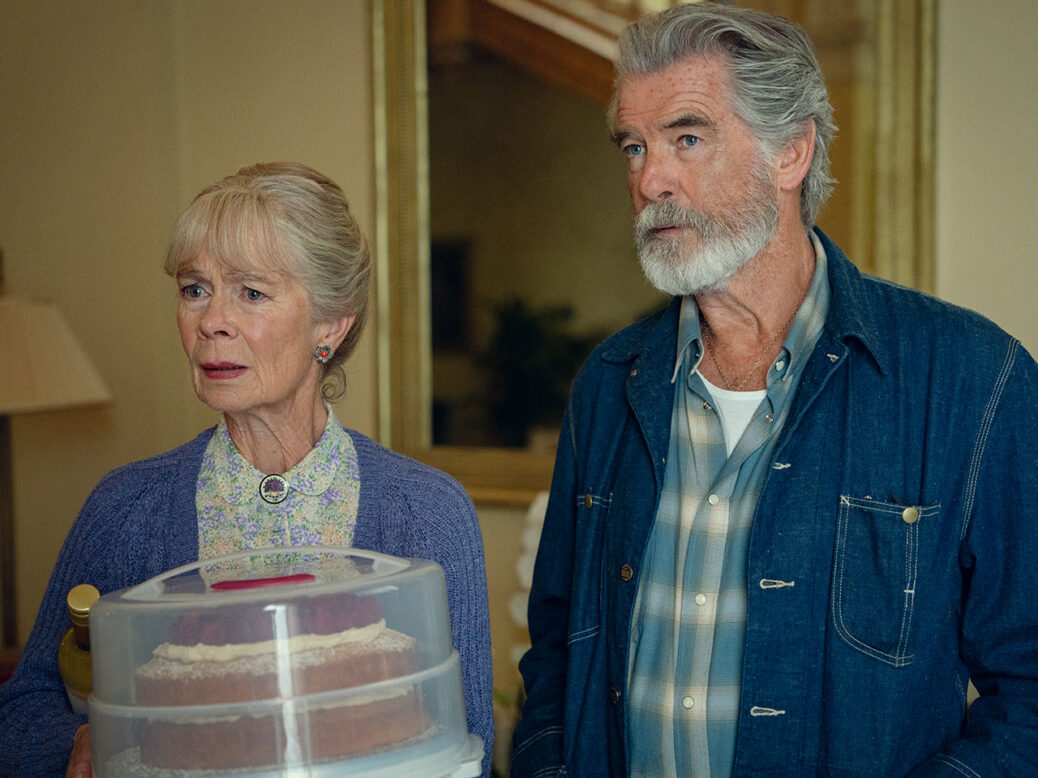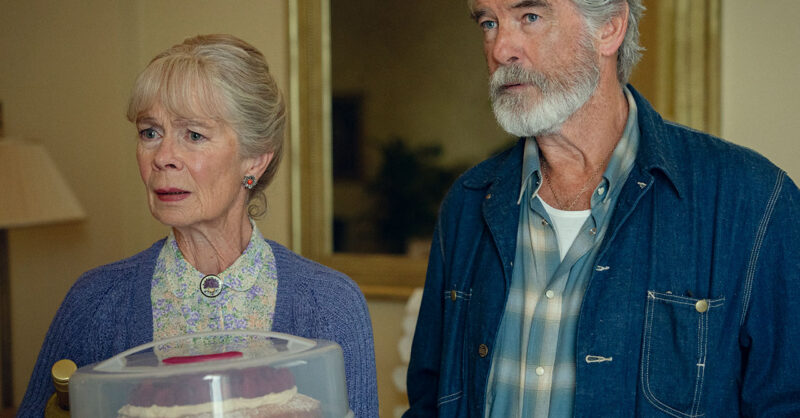
Photo by Netflix
The world is quite ludicrously disappointing at the moment, so I’ve been taking refuge in television. It hasn’t helped.
I had, admittedly, been primed to be annoyed with Netflix’s feature-length adaptation of The Thursday Murder Club – not because I don’t like the book but because I do. Author Richard Osman has an obvious fascination with people and their foibles, something it’s hard not to connect with his years working on game-shows, and his novels overflow with human warmth and sympathy. (I listened to the fourth as an audiobook, and one scene – if you’ve read it, you’ll know which – had me bawling my eyes out in the street.) But I was always cynical about the idea of squeezing a story whose joy lies in plot detours and wry narration into a two-hour film, and I’m sorry, but Pierce Brosnan is not Ron.
And lo, it came to pass. Brosnan is actually not bad – one of the genuine highlights is his beatific smile during a pensioner aquarobics class – but he’s not obviously the character from the books, and should quite obviously be Ray Winstone. Worse, Joyce (Celia Imrie), who as narrator is the closest the books have to a protagonist, has been sidelined because Elizabeth (Helen Mirren) is more famous. If you’re going to make a version so stripped down you’re basically just expecting applause for familiar characters, you need to actually show those characters. (This, perhaps, is why at one point Mirren all but literally turns to camera to announce she was a spy.)
Oh – and even nice old people’s homes don’t look like Downton fucking Abbey. Really, I don’t mean to go on, but then I doubt the film-makers meant to muff the ending in a way that torpedoes later books either. This should have been a six-part BBC One series with budget to match. But I’m sure the money was very nice.
I would be coping better with all this had it not arrived in the same week as a second disappointing adaptation, this one of actual historical events. I’ve wanted a TV show about the years leading up to the Norman Conquest of 1066 for literally decades, ever since I read the relevant chapter of Simon Schama’s A History of Britain and realised it was basically England’s I, Claudius. (The story of Emma of Normandy – a woman who marries an English king, then marries the invading Danish king who ends up replacing him, then helps a son from her second marriage to the throne, then does the same to a son from her first marriage – makes the empress Livia look positively shy and retiring.)
The BBC’s King & Conqueror – James Norton as Harold Godwinson, Nikolaj Coster-Waldau as William the Bastard, reimagined here as sort mismatched political buddies – started a bit later than most of the good bits of Emma (Juliet Stevenson)’s career. Exactly when, though, is not clear – Edward the Confessor’s 24-year reign now lasts about six months. I can cope with that, and with the various name changes (the female name shortage in medieval England is well-attested, and you can’t call everyone Edith or Matilda or Aelfgifu). But the bits where they just make stuff up, which had me googling to see whether it was I or the writers who were wrong, is baffling because the story was more than interesting enough already.
Both these things are, to be clear, fine. They’re not great; but they’re not crimes against eyeballs, either. They pass the time. The reason they annoy me so is because of what I’ve come to think of as the John Adams problem. The 2008 HBO miniseries about the second US president begins with two brilliant episodes about America’s path to revolution. Then, though, it follows Adams to France in search of allies and thus misses both the War of Independence and the creation of a new nation-state. After that, it follows him out of France, so he misses the revolution there too. John Adams is a beautifully made story about a man with an incredible talent for walking out of rooms just before history happens in them.
Subscribe to The New Statesman today from only £8.99 per month
I’m aware that I’ve just switched from complaining something is inaccurate, to complaining something else is not inaccurate enough. (It was an adaptation of a biography: of course it followed Adams.) But the reason John Adams frustrates me so is that the American Revolution is a fascinating story that seems ripe for the peak TV treatment, but no one’s ever done it – and “well, HBO already made John Adams” is surely a big part of the reason. In the same way, there can now be no Sunday night miniseries version of The Thursday Murder Club books; and no one will be making a better drama about the road to Hastings any time soon, either. It’s not that these adaptations are bad – but by existing, they prevent us from getting something better.
Meanwhile, HBO is doing what looks increasingly like a shot-for-shot remake of the extant Harry Potter films, at vastly greater length, even though nobody asked them to. Like I said: disappointing.
[See more: The Girlfriend review: bizarre love triangle]
Content from our partners


